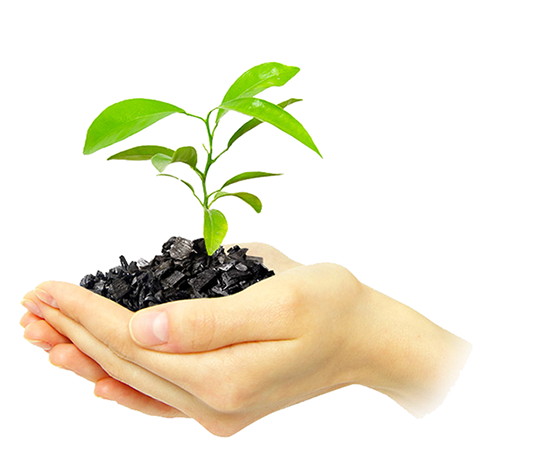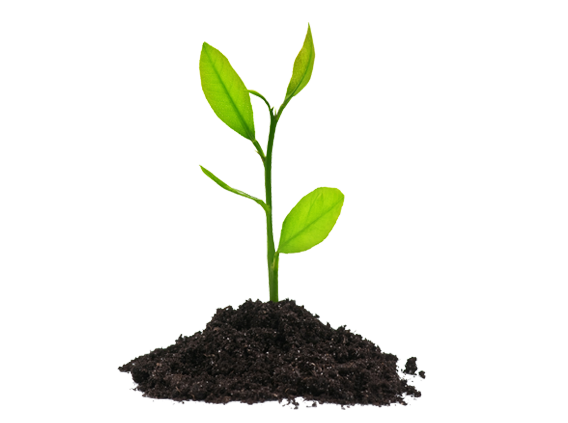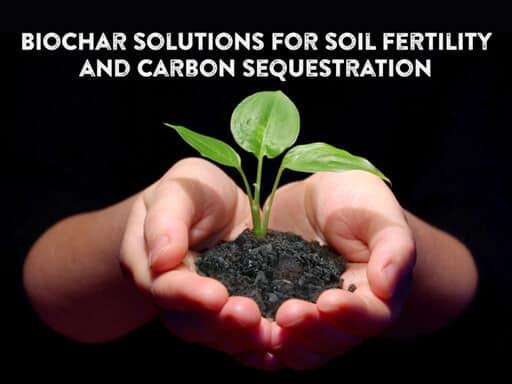Biochar Information
Biochar fertilizer is charcoal used as a soil amendment. Biochar can enhance water quality, minimize soil emissions of greenhouse gases, reduce nutrient leaching, reduce soil acidity, and reduce irrigation and fertilizer needs.
An Ancient Soil Conditioner — Biochar agriculture has been used in agriculture for more than 2,500 years and is becoming increasingly popular in modern agriculture and horticulture as a sustainable soil amendment.
Biochar Enhances Soil fertility & Protects Water Quality:
Enhanced Nutrient and Water Retention in the soil — Biochar agriculture outshines all other organic soil material in its ability to retain water and nutrients, as well as hold phosphorous and agrochemicals.
Persistence — Biochar fertilizer is relatively inert and therefore persists in soil far longer than any other organic soil additives.
Less Fertilizer Needed — When added to the soil, biochar enhances plant growth and crop yields while reducing the total fertilizer required.
Biochar Fights for Climate Change:
Decomposing or burning biomass releases CO2 into the atmosphere and plants reabsorb it. Burning fossil fuels puts excessive carbon dioxide into the air, more than can be absorbed naturally. This traps heat in the Earth’s atmosphere. Reducing atmospheric carbon dioxide is critical to combat climate change.
A Perfect Circle Solution — Burning biomass through pyrolysis to produce energy instead of burning fossil fuels is a carbon-neutral process; it neither adds to the climate-change problem nor reverses it.
Biochar when applied to the soil, reduces the overall amount of atmospheric carbon dioxide by removing it from the active cycle. Biochar also enhances plant growth which, in turn, absorbs more carbon dioxide from the atmosphere. Overall, these advantages make the biochar process carbon negative when biomass production is managed sustainably.
Other Benefits Of Biochar:
Biochar production is fully scalable stationary pyrolysis ovens: from cooking stoves in India or furnaces for household use to on-site mobile ovens for treating forest restoration, to industrial-sized units for heating and power generation.
Combined Heat and Power (CHP) — Heat and power created during pyrolysis can generate electricity and provide heat for individual homes and businesses or entire communities.
Biofuels — Combustible gases, as well as hydrogen, are captured during pyrolysis to produce a valuable fuel. Bio-oil is another valued product produced during pyrolysis.
Solid Waste Conversion — Overloading of landfills and open burning are avoided when bio-waste becomes a marketable product. Less waste means less carbon dioxide and methane emissions from landfills as well.
From Waste to Value—Once a worthless and costly byproduct, biomass waste is now a valuable resource. Through activated biochar, biomass becomes a value-added product for agricultural and forest communities by improving soil and reducing forest fire hazards.
Carbon Offsets — Carbon credits are valuable assets for sale or trade-in the offset and cap-and-trade markets.
What's Biochar Worth:
Biochar is sold as a soil amendment however there are many industries that utilize. The biochar cost varies significantly based on location, density, porosity, quality, and availability.
Syngas and bio-oil markets are evolving. Most biochar products manufacturers retain these by-products for on-site use or sell as fuel for the local industry. Costs and benefits vary by region and situation. Industrial-sized applications are more costly.
Economics will further increase biochar technology as it becomes more widespread and carbon prices improve.



